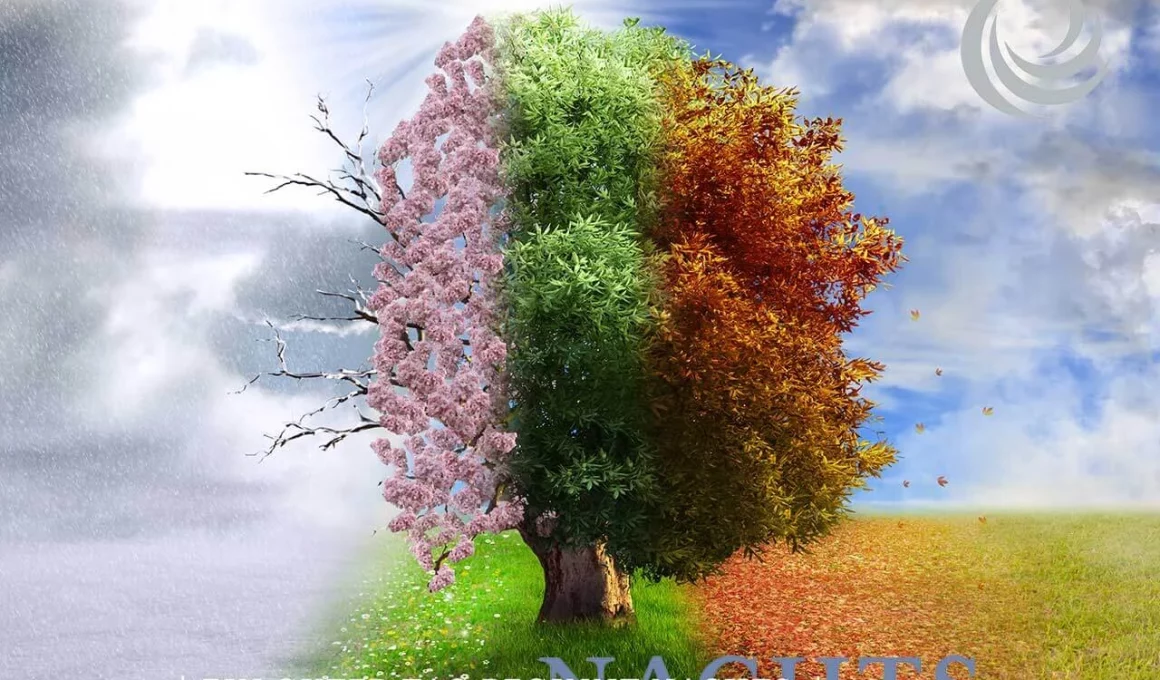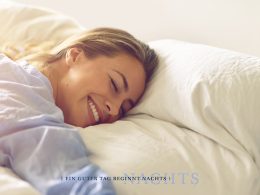The sleep hormones serotonin and melatonin influence your sleep
Sunlight and the alternation of light and dark have a decisive influence on our internal clock and therefore on our sleep behaviour. The body’s day-night rhythm is controlled by the hormone melatonin. If light enters the eye via the retina during the day, the release of the hormone is stopped: we wake up. In the evening, when there is no light, melatonin is released into the blood again and can develop its sleep-promoting effect throughout the body: We become tired.
Due to the different light conditions during the seasons, there is also an annual rhythm: In winter, melatonin is produced over a longer period of time than in summer. This increases the need for sleep. We feel more tired during the day than in summer.
Sleep hormones ensure periodic changes in sleep behaviour
When the days become longer and brighter again in spring, the body produces the hormone serotonin. It is a kind of antagonist of melatonin. Depending on which hormone predominates, we feel awake and energetic or tired and heavy in bed. The increased serotonin levels in spring mean that we don’t sleep as well at night. This leads to spring tiredness. In summer, sleepers have to adjust to even longer periods of light and warm outside temperatures, even at night. As a result, the body temperature does not drop as usual when you fall asleep and you lie awake for longer.
As temperatures fall in autumn and winter, the serotonin-melatonin rhythm also changes again. Less light and colder temperatures mean more melatonin is released again. The sleep cycle through the seasons starts all over again. In addition, twice a year the artificial time shifts of the changeover from summer to winter time or vice versa cause the body problems. This ‘mini-jetlag’ disrupts our sleep rhythm and makes us tired. People need four to 14 days to get used to the one-hour shift in sleeping time.
Did you know that tribes in Siberia used to hibernate about 100 years ago?
Due to food shortages, families would gather around the fire at the first snow and go to sleep. Only once a day did everyone get up briefly and eat a piece of bread.
SPRING:
The transition from melatonin to serotonin production causes problems for the body
With the first warmer rays of sunshine of the year comes spring fatigue. As the body adapts to the new light conditions, the hormones switch from melatonin to serotonin production, which also has an effect on sleep behaviour. The body temperature rises, blood vessels dilate, blood pressure drops, old cells are replaced and new ones are formed. The immune system is still recovering from the winter, when it had to withstand cold temperatures and waves of flu. As a result, the circulation doesn’t really get going, the internal clock continues to hibernate and you feel tired. As it is light for longer, we unconsciously go to bed later and wake up earlier. Sleeping time is shortened. It takes three to four weeks for the body to fully adjust.
SUMMER:
The serotonin hormone is booming – heat and light keep us from sleeping
The light-intensive days in summer mean that we sleep less than in winter and are also more restless. The brightness signals to the brain very early on that it is time to wake up. The lack of cooling of the body on warm nights adds to this. Normally, our biological clock ensures that our body temperature drops by 0.5 to 1 degree at night. However, if the outside temperature is too high, this no longer works.
AUTUMN:
Our need for sleep increases – just like the melatonin in our body
In autumn, our sleep rhythm changes again in the opposite direction. Shorter days and less light mean that the body releases more melatonin – often even during the day. The need for sleep increases by around half an hour in autumn. However, this does not mean that you feel more rested due to longer sleeping times.
WINTER:
Increased need for sleep due to the sleep hormone melatonin
Winter exacerbates the sleep symptoms of autumn. The altered sleep rhythm due to the long periods of darkness increases the feeling of tiredness. You don’t wake up properly during the day and don’t feel really sleepy at night. However, our everyday life does not do justice to the increased need for sleep in winter. This is because our daily rhythm is dictated by working hours and appointments. This does not change in winter.
CONCLUSION:
The seasons determine our sleep rhythm!
The influence of sunlight in particular is decisive. However, our everyday lives take little account of these special features of the seasons, which often leads to a sleep deficit. Changing the clock to summer or winter time poses an additional problem for healthy sleep.














